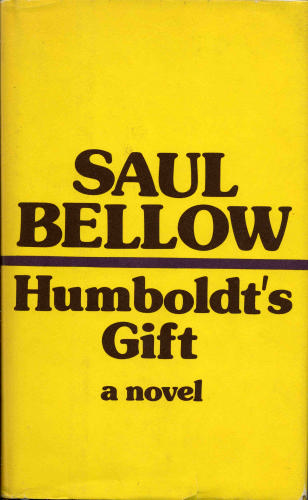
An excerpt from the January issue’s review of Humboldt’s Gift, the full text of which is available on believermag.com
Central Question: We’re obviously distracted, but what should we be paying attention to?
Year of novel’s publication: 1975
Humboldt’s description of the Pulitzer Prize: “a dummy newspaper publicity award given by crooks and illiterates”
Year novel was awarded the Pulitzer Prize: 1976
Concessions for sale at a Chicago steam bath circa 1975, according to novel: “slabs of meat, potato pancakes, coleslaw, grapefruits”
Representative passage: “The human being, more and more oppressed by the peculiar terms of his existence—one time around for each, no more than a single life per customer—has to think of the boredom of death. O those eternities of nonexistence! For people who crave continual interest and diversity, O! how boring death will be!”
“What you really want is to get rid of everybody, to tune out and be a law unto yourself.” These words are spoken to Charlie Citrine, the narrator of Saul Bellow’s Humboldt’s Gift, but could they not also refer to the contemporary reader, who must tell the world and its importuning texts and emails to shove off while he cracks a book? He certainly has to withdraw to read Humboldt’s Gift, a mess of a novel that overflows with information: “Human activity, often frenzied and feverish in Bellow’s fiction,” wrote John Updike in his ambivalent New Yorker review, “is more than ever felt as a distraction to thought.”
The novel’s here-comes-everybody quality can indeed be trying: skeins of plot and character unravel on every page, like text messages adding up on an airplane passenger’s phone upon landing. Charlie meditates on the author’s place in postwar America, on Chicago’s vanishing ethnic neighborhoods, on the nation’s decaying cities. He grapples with the costs of affluence and notoriety. He’s hassled by a mobster, sued by his ex-wife, teased by his mistress. He dabbles in Rudolf Steiner’s theosophical teachings and briefly tags along with Robert Kennedy, the senator’s “foxy head high with hair.” One wonders if Bellow needed to include summaries of not one but two film treatments; Charlie’s late travels to Texas and Madrid feel hurried and appended, and the literary allusions (“So spoke old Dr. Samuel Johnson, and added in the same speech, that the French writers were superficial…”) creak wearily by the book’s end.
Yet it’s thanks to all this motion that the novel now seems prescient. Written decades before an iPhone mewed from every pocket, it anticipated, in the sheer amount of stuff it throws at its hero, the daily churn of busyness that awaited the twenty-first-century individual—after a fashion, Humboldt’s Gift is the first great account...
You have reached your article limit
Sign up for a digital subscription and continue reading all new issues, plus our entire archives, for just $1.50/month.
Already a subscriber? Sign in




